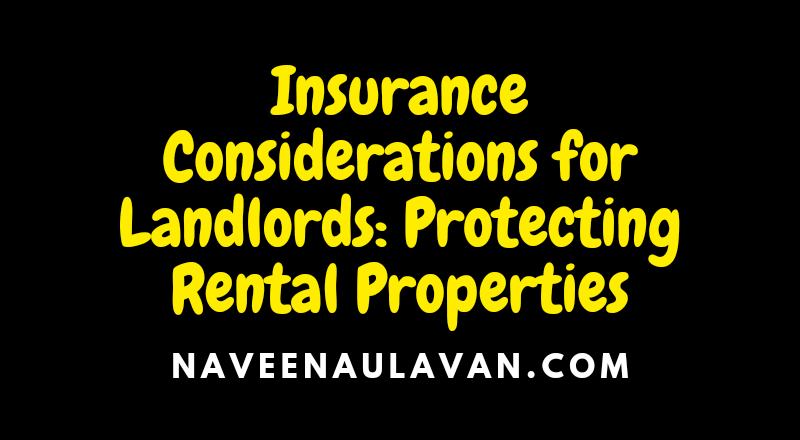Being a landlord comes with certain risks and responsibilities. One of the key factors in safeguarding your investment is having appropriate insurance coverage for your rental property. Insurance can protect you from financial loss due to accidents property damage liability claims and other potential risks associated with being a landlord. In this article we will discuss important insurance considerations for landlords and how to effectively protect your rental properties.
1. Understand the Types of Insurance Coverage
1.1. Property Insurance
Property insurance is the most fundamental coverage for landlords. It protects the physical structure of your rental property from perils such as fire weather events vandalism and theft. This coverage typically pays for repairs or replacement of the damaged property allowing you to quickly recover from unforeseen circumstances that could otherwise result in significant financial loss.
1.2. Liability Insurance
Liability insurance provides protection in case someone is injured on your rental property and holds you responsible. It covers legal expenses medical costs and potential compensation payments in the event of a liability lawsuit. This coverage is crucial because as a landlord you can be held liable for accidents or injuries that occur on your property even if you were not directly involved.
1.3. Loss of Rental Income Insurance
Loss of rental income insurance also known as business interruption insurance is designed to compensate landlords for lost rental income in the event that their property becomes temporarily uninhabitable due to covered perils such as fire or storm damage. This coverage can be invaluable as it helps cover ongoing expenses such as mortgage payments during the time needed to repair or rebuild the property.
1.4. Umbrella Insurance
Umbrella insurance acts as an extra layer of liability protection. It provides coverage beyond the limits of your primary liability insurance policies such as general liability or auto liability insurance. This coverage is particularly important for landlords as it can protect you from substantial financial loss in the event of a large liability claim or lawsuit that exceeds the limits of your underlying insurance policies.
2. Assess the Value of Your Rental Property
2.1. Accurate Property Valuation
To ensure your rental property is adequately insured it is essential to assess its value accurately. This includes considering the costs of rebuilding or repairing the property in case of a disaster. Hiring a professional appraiser or using online property valuation tools can help you determine the appropriate coverage amount for your property.
2.2. Consider Property Appreciation
Keep in mind that the value of your rental property may appreciate over time. Periodically reviewing and updating your insurance coverage is crucial to ensure your property is adequately protected and that your coverage keeps pace with the current market value.
3. Review and Understand Policy Exclusions
3.1. Read the Fine Print
Carefully reviewing your insurance policy documents is vital to understand what is covered and what is excluded. Familiarize yourself with policy exclusions and limitations to avoid any surprises when filing a claim. For example some policies may exclude certain perils such as floods or earthquakes requiring you to purchase separate coverage if you live in an area prone to these events.
3.2. Tenant-Related Exclusions
Some insurance policies may have specific exclusions related to tenant-related damages or illegal activities conducted by tenants. Ensure you understand these exclusions as they may impact your coverage and potential claims. Consider screening prospective tenants thoroughly to minimize these risks.
4. Consider Tenant Insurance Requirements
4.1. Mandating Tenant Insurance
Requiring tenants to have renter’s insurance is a prudent practice for landlords. Tenant insurance protects tenants’ personal belongings and provides liability coverage in case they cause damage to the rental property. By mandating this requirement you transfer some of the potential liability away from yourself as a landlord.
4.2. Verification of Tenant Insurance
When implementing a tenant insurance requirement ensure you have a system in place to verify that tenants have active insurance policies in force. Request proof of insurance documentation before the lease begins and communicate the importance of ongoing coverage to prevent any lapses that could leave you exposed to unnecessary risks.
5. Work With an Experienced Insurance Agent
5.1. Seek Professional Advice
It is highly recommended to work with an experienced insurance agent who specializes in rental property insurance. They can assess your specific needs offer guidance on suitable coverage options and help you navigate the complexities of insurance policies. An agent with expertise in landlord insurance can tailor your coverage to adequately protect your rental properties.
5.2. Periodic Policy Reviews
Regularly reviewing your insurance policy with your agent is important to stay up to date with new coverage options policy changes and adjust your coverage as your rental property portfolio evolves. Building a long-term relationship with an insurance professional who understands your specific needs can greatly benefit you as a landlord.
Conclusion
Protecting your rental properties through effective insurance coverage is vital for landlords. Understanding the different types of insurance coverage available accurately assessing the value of your property reviewing policy exclusions considering tenant insurance requirements and working with an experienced insurance agent are key considerations in safeguarding your investment. By taking these measures and staying informed about insurance best practices you can mitigate risks and ensure the long-term protection of your rental properties.
